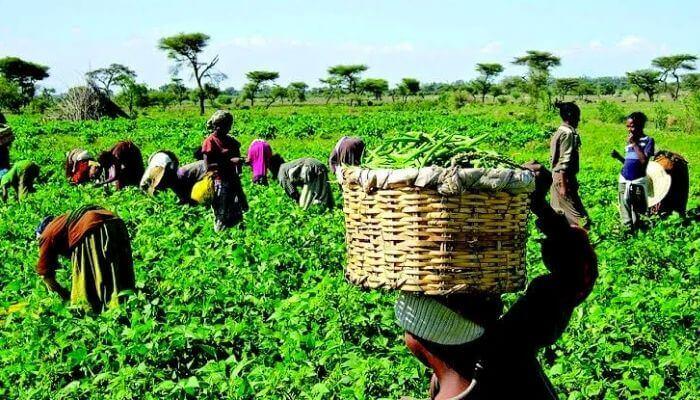Stakeholders call for investment, innovation in Nigeria’s agriculture sector
…Afreximbank calls for action to close $150bn annual agricultural investment gap
Stakeholders in the agricultural and agribusiness sectors have called for increased investment, innovation, and technology adoption to drive Nigeria’s food security.
The call was made at the opening ceremony of the 2nd edition of the Farm, Food and Allied Technology (FARMFATECH) Expo 2025, held on Monday in Abuja.
The three-day event, which brings together farmers, investors, policymakers, and innovators from across Africa and beyond, is jointly organised by the Abuja Chamber of Commerce and Industry (ACCI) and Autodex Nigeria Limited, with support from the African Export-Import Bank (Afreximbank) and the Federal Ministry of Agriculture and Food Security.
Speaking at the event, Alain Thierry Mbongue, President of Afreximbank, represented by the Bank’s Acting Regional Chief Operating Officer and Head of Mission (Anglophone West Africa), reaffirmed the Bank’s commitment to agricultural transformation and value chain financing across Africa.
“Afreximbank recognises agriculture as the cornerstone of Africa’s development, supporting food security, job creation, industrialisation, and sustainable livelihoods,” Mbongue stated.
He highlighted that global agricultural investment must increase significantly to meet the food demand projected for 2050, with a financing gap of about $150 billion annually in developing countries.
According to him this presents both challenges and opportunities for institutions like Afreximbank, adding that the Bank is implementing tailored financial and advocacy solutions to address issues such as high risk perception, limited access to collateral, and inadequate infrastructure.
According to Mbongue, Afreximbank’s Sixth Strategic Plan prioritises industrialisation and export development to reduce dependence on raw commodities and promote value-added production.
The Bank, he said, is already implementing a range of interventions in Nigeria, including project preparation facilities, advisory services, debt and equity financing, insurance solutions, and capacity-building programmes for youth and women-led agribusinesses.
He also spotlighted key Afreximbank initiatives such as the Africa Trade Gateway (ATG), a digital platform offering compliance, trade, and market intelligence solutions and the Africa Quality Assurance Centre (AQAC), established in Ogun State to ensure Nigerian agricultural exports meet international standards.
Emeka Obegolu, President of the Abuja Chamber of Commerce and Industry (ACCI), represented by Olasetemi Bode Thompson, the Chamber’s Vice President of Agriculture, said the Expo underscores the urgent need to modernise Nigeria’s agricultural systems and expand agribusiness investments through technology-driven solutions.
“This Expo is more than an exhibition; it is a movement toward achieving food sufficiency and sovereignty in Nigeria. It bridges the gap between policy and practice, between local potential and global opportunity,” Obegolu said.
He noted that over 500 exhibitors from 76 countries and 500,000 visitors are expected at the 2025 edition, making it one of the largest agricultural innovation gatherings in West Africa.
The ACCI president emphasised that mechanisation and digital agriculture are central to transforming productivity, improving efficiency, and mitigating challenges such as insecurity and limited access to arable land.
He urged stakeholders to make food production a national priority under a revived “Food First” philosophy.
In his remarks, Nnamdi Ezeanyim, Chairman of the Board of Directors, Autodex Nigeria Limited, underscored the importance of indigenous innovation and industrial resilience in transforming Africa’s agricultural landscape.
“Last year, we at Autodex were just beginning to make our mark producing combustible engine tricycles with about 30 percent local content as mandated by the government. Barely a year later, we have grown those roots into a strong and purposeful tree,” Ezeanyim said.
He said that Autodex had increased its local content to 42 percent and successfully transitioned to the production of fully electric tricycles, emphasising that this milestone was achieved through belief in African innovation and persistence despite challenges.
Ezeanyim further disclosed plans to unveil Nigeria’s first hybrid tricycle by the second quarter of 2026, a vehicle designed for both electric and biofuel operation, providing affordable, sustainable mobility for rural and urban areas.
“Imagine a tricycle that runs seamlessly on electric power within city limits and shifts intelligently to biofuel in remote areas, affordable, sustainable, and locally assembled. That is not just innovation; that is common-sense engineering made in Nigeria,” he said.
Read also: $500m World Bank loan to unlock agribusiness value chains — Kyari
Also speaking, Permanent Secretary, Federal Ministry of Agriculture and Food Security, represented by Abubakar Musa, Director, Federal Food and Drug Authority, commended the Abuja Chamber of Commerce and Industry (ACCI), Autodex Nigeria Limited, Afreximbank, and other sponsors for driving agricultural innovation and investment.
He said that the Federal Government had recapitalised the Bank of Agriculture to the tune of ₦1.5 trillion (about $1 billion) to expand access to credit for farmers and agribusinesses, while strengthening the Nigeria Agricultural Insurance Corporation (NAIC) to de-risk agricultural investments.
He added that government initiatives, including the launch of 2,000 tractors by President Bola Ahmed Tinubu, demonstrate a firm commitment to mechanised farming, improved seeds, fertilisers, irrigation, and climate-resilient practices.
“The Federal Ministry of Agriculture and Food Security shall continue to promote agribusiness investment and strengthen production technology through its policies and programmes, working with private sector partners to achieve sustainable productivity and food security,” she affirmed.

